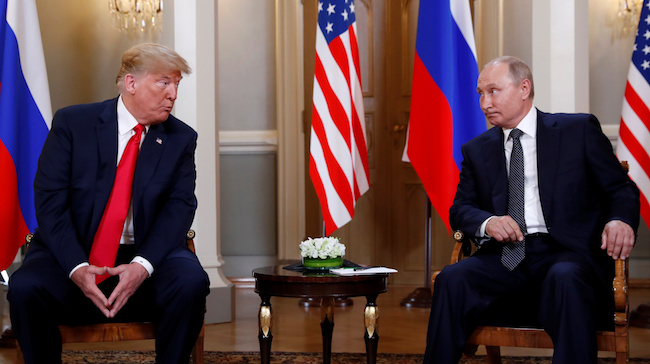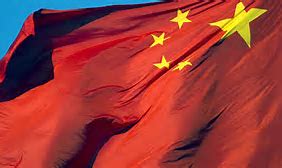![]()
President Donald Trump proved to Russian President Vladimir Putin on Monday that he is nobody’s puppet — not Putin’s, not the Deep State’s, and not the establishment media’s. Like the moral strength he showed in Charlottesville, VA, last year, Helsinki should be remembered as one of Trump’s finest moments.
Last August, some truly evil people showed up in Charlottesville. On one side, you had white supremacists, and on the other, you had the left-wing terrorist group Antifa. A riot broke out, one person was murdered, and another 30-plus others were injured.
Almost immediately, the media crafted a narrative around Charlottesville that determined what Trump was supposed to do, which was to make a statement condemning racism and racists. Which he did, more than once. But he also did something he was not supposed to do and that was to, at long last, make an issue of Antifa, who had been running around for the better part of a year acting as the organized left’s Brownshirts.
Antifa had not just been targeting the alt-right. Antifa had been targeting mainstream, everyday conservatives and Trump supporters. And because the establishment media also advocates in favor of violence against the right, Antifa was able to terrorize us with impunity thanks to a media that deliberately ignored, downplayed, justified, glorified, or romanticized their reign of terror.
By having the moral courage to go off-script, Trump used Charlottesville to finally drag these terrorists into the national spotlight, and he did so by telling the truth, by accurately pointing out that “both sides” were responsible for that national disgrace. Trump also had the moral courage to point out there were “good people” on both sides; those who are not racists, who are not left-wing terrorists, who had arrived in good faith to protest against the tearing down of a statue and against racism. The New York Times, of all places, eventually proved Trump correct on this point.
But Trump was supposed to only condemn the white supremacists. He was not supposed to pour sunlight on the media’s shock troops in Antifa, which would limit their effectiveness in the future (and has). He was not supposed to point out that people of good faith can oppose purifying our history with the tearing down of statues. And this is why the media lost its mind for a week.
You see, the establishment media are left-wing activists only interested in one thing, and it has nothing to do with informing the public. Like all leftists, what these awful people most care about is control. The power to control people and events is what defines who they are, and when they sense they are losing that power, when someone dares defy them, like all spoiled children who do not get what they want, they do the only thing left to hold on to their sense of control — they stage a public tantrum.
The media’s post-Charlottesville tantrum was a wonder to behold, and it continues to this day, primarily through lies. Still bitter over Trump’s defiance, the media have fabricated the myth that Trump did not condemn racists (he did, more than once), that he said there are good Nazis (he didn’t), that he created a moral equivalence between racists and anti-racist protesters (he didn’t — what he did was accurately equate Antifa and white supremacists).
Almost a year later, Trump is still walking around with the flaming arrows in his back over Charlottesville, simply because he told the truth about Charlottesville. Which brings me to what happened Monday in Helsinki.
Once again, and this time with the help of that dirty cop, Special Counsel Robert Mueller, the establishment media and the Deep State believed they had rigged events to a point where Trump was cornered, where he would have no choice but to publicly berate Putin on the national stage for the sin of “interfering in our elections.”
What the media wanted was to emotionally blackmail Trump into creating an international scene, a YouTube moment with Putin, where the president would violate every diplomatic norm to publicly shame and berate the Russian president.
Why do you think Dirty Cop Mueller dropped his kangaroo indictment (more on this below) just a few days before the Putin summit? It was all coordinated and staged, it was the behavior of spoiled children desperate to get their way.
Wisely, for the good of his country and out respect for the truth, Trump refused to jump in the trap. And now the spoiled children who once again did not get what they want, are having a national tantrum. And moral cowards, like House Speaker Paul Ryan (God bless Rand Paul), are terrified of these spoiled media babies and are seeking only to appease them.
Nevertheless, what really happened is this: Trump showed the gangster Putin that he is his own man, that he cannot be bullied by America’s corrupt political and media establishment into behaving in a certain way, that he is willing to take those flaming arrows to do what he thinks is right, which, in this case, is to never forget the lessons of Iraq.
Keep in mind that what Trump was supposed to do Monday was to drink the Kool-Aid, was to believe our Intelligence Community (IC) got it 100 percent right about Russian meddling, was to throw diplomacy out the window and publicly embarrass Putin.
Thankfully, Trump refused to do that, and now the spoiled children, just as they did after Charlottesville, are again lying and claiming Trump “sided with Putin,” when the only thing Trump’s guilty of is remaining diplomatic, which is the whole point of a summit expressly arranged to facilitate peace.
What is so incredible is that, in this the year 2018, after the intelligence catastrophe that was Iraq, after learning the IC was actively meddling in the 2016 election using Kremlin-fed propaganda in the form of a dossier, only a crazy man would swallow whole what the IC is telling him, and only a dangerously weak man would risk damaging relations with Russia further in order to symbolically appease the IC.
The truth is this, and we all know it, especially those currently in the middle of their tantrum:
- Personally, I am not convinced Russia meddled in our election, and I find Dirty Cop Mueller’s kangaroo indictments of people he will never have to prove a case against (because he knows they will not be extradited) to be nothing less than the actions of a flailing prosecutor who’s got less than nothing. Mueller indicting non-American citizens working on behalf of a hostile government is the dumbest thing I have ever seen in my life. It would be like Reagan’s Justice Department indicting the KGB.
- Because the documents that convinced Republican investigators Russia meddled in our election came from our IC, I find those conclusions just as suspect.
- Even if the Russians did meddle in our elections, it appears to have been nothing more than drop-in-the-bucket Facebook and Twitter expenditures that ended up being less than meaningless. Moreover, most of this Russian monkey business occurred after the election and was targeted against Trump.The worst case scenario is Russia figured out John Podesta’s email password was “password” and disseminated his emails. But where is the proof?Regardless, is it not interesting that Dirty Cop Mueller’s kangaroo indictment left out one pertinent fact, the fact that — if you believe any of this — the Russians also tried to hack the GOP, and failed?
- We meddle in other country’s elections, other countries meddle in our elections, and suddenly I am supposed to give a damn? Russia has been meddling in American politics going back decades and all of a sudden this fact of life demands Trump stage an international incident? Are these people out of their minds? We all know what is going on here — the only reason we are required to suddenly care about decades-old espionage-as-usual is because the media and the political establishment cannot accept losing the 2016 presidential election.
- Once burnt, twice shy.To my eternal shame, I swallowed the case for WMDs in Iraq hook, line, and sinker. Why, back in ’02, the very idea the patriots within the IC could get such an important matter wrong — to even suggest such a thing, was unpatriotic.And now I am watching this dangerous horseshit play out all over again, where it is un-American to question the IC, where we have “super patriots” running around defining patriotism as drinking the FBI/CIA/IC Kool-Aid, where the jingoistic media is trying to out-jingoize each other by screaming about “acts of war,” where the pursuit of peace is treason, and those who pursue peace are traitors…Where, for some obscene reason, we are supposed to always believe the IC, which means we must condemn the peacemakers like Trump who dare remain skeptical.
Most of all, we are required to forget that this is the same IC that missed the fall of the Soviet Union, missed 9/11; that led us into a harrowing and pointless war in Iraq; that used a dossier filled with Kremlin-fed propaganda to frame Trump; that lionizes proven liars like James Clapper, Dirty Cop James Comey, and John Brennan; that hands ego-maniacal monsters like Peter Strzok extraordinary power (and still has him on the payroll); that uses a kangaroo indictment that says the Russians hacked the DNC, even though no one in law enforcement has inspected the DNC server.
Sorry, but when the American IC is not incompetent, it is corrupt in ways that would not be believed in fiction.
- Trump’s actions speak for themselves. His actions, not his words when engaged in direct diplomacy, which of course require a certain amount of finesse and BS, are what matter.It is simply a fact that Trump has been tougher on Russia than both his predecessors combined. He has increased Russian sanctions, directed many of those sanctions directly at Putin’s inner circle, has drawn a real red line in Putin’s client state of Syria, twice bombed Putin’s client Assad, is openly admonishing Germany for being Putin’s energy client, overturned Obama’s appeasement of Putin by giving Poland anti-missile defense, ordered Russian diplomatic properties closed in D.C., Manhattan, Seattle, and San Francisco; Trump has armed Ukraine and is aggressively pushing our NATO partners to invest even more into an organization built specifically to defy Russia.Which means that what Putin saw in Helsinki is a firm American president who cannot be bullied, berated, blackmailed, or cajoled, even with the threat of a week-long tantrum performed by spoiled babies back in his own country.This is a good thing.
I did not vote for Donald Trump because I wanted to risk another Cold War as a means to make the IC feel better about itself. I did not vote for Donald Trump because I wanted the status quo respected, which means more foreign adventures and the appeasement of an increasingly unbalanced national media.
I voted for Donald Trump because I want to keep my guns, I do not want to bake gay wedding cakes, I do not want my vote canceled out by illegal aliens, and most of all, after eight years of George W. Bush’s stupid wars and eight years of Barack Obama’s leading from behind while strangling our economy, my country deserves an era of Peace and Prosperity.
And Monday, in Helsinki, while knowing full well the hell that would be unleashed on the other side, President Trump did the right thing in pursuit of Peace. This is not me arguing he was perfect, that he could not have been more articulate, but that he did the right thing is beyond dispute.
For two years the media and Never Trump assured and reassured me that Trump was a shallow and feckless man interested only in one thing: adulation and praise. But on Monday in Helsinki, just as he did in Charlottesville, I saw Trump choose, at great personal cost, to do the moral and patriotic thing over what would have earned him that adulation and praise.
Follow John Nolte on Twitter @NolteNC. Follow his Facebook Page here.
Source: Breitbart






























